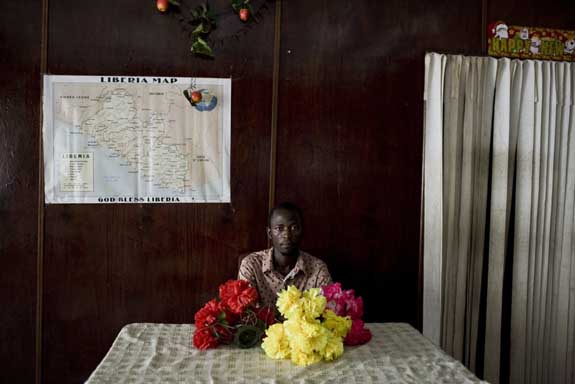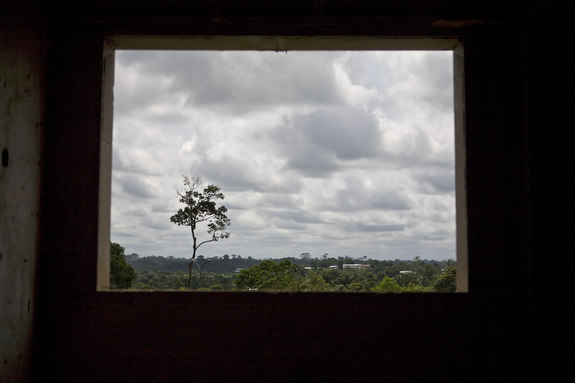The mansion was scheduled for completion in the summer of ’91, after it was commissioned by Samuel Doe, the young army sergeant from Grand Gedeh who wrested power from William Tolbert in the 1980 coup. For his thirty-ninth birthday, President Doe planned a party at his new home–dinner in the blue room followed by dancing around the pool, lined with a mosaic of the Liberian flag. Four months before the celebrations, Doe was captured and hacked to death–ear by ear, limb by limb–in a grisly show of violence orchestrated by the former rebel chief Prince Johnson, a presidential candidate in October’s presidential race, and a former ally of the ex-President Charles Taylor, convicted on 11 counts of war crimes at The Hague last month.

After Doe’s death, the laborers dropped their trowels and cement mixers. They left their cans of paint open in the the November sun. Years passed. Kids started to use the place as a playground. Geckos hung from the bedroom walls. Spiders spun webs between the fake stalactites commissioned by Doe’s interior designer. Expat aid workers turned up for picnics, watching the sun set from its balconies. Allegedly, The UN High Commission for Refugees even considered leasing it as office space.
Doe’s sister Edith turns up occasionally; she sits in a frayed deck chair in the yard, checks the rooms for cavities, signs of decay. But twenty years after Doe’s death, despite seasons of unabating sun and fierce lashings of rain, the house remains. It overlooks Zwedru and the forest beyond. It is a reminder of an interrupted history.
Grand Gedeh saw some of the worst upheaval during Liberia’s fourteen-year war, which ended in 2003. According to the European Commission, the county’s health and education systems are the poorest in Liberia. The EC also estimates that during the conflict, as many as three-quarters of the county’s young people were recruited as combatants.
“Grand Gedeh is Liberia’s open wound,” said Joseph Sherman, who works in the county for the Liberian rights group Foundation for International Dignity. “Monrovia is getting plenty of development and Grand Gedeh is just a speck on the government’s radar.”
Displacement and resettlement over nearly twenty years have created confusion over land ownership. Meanwhile, mining for illegal gold—which can net about twenty dollars per gram in Zwedru—is a lucrative, if unstable, source of cash for the unschooled youth. Grand Gedeh’s poor so are far removed from Monrovia, where development is slowly bringing streetlights, clean drinking water, and education for all, that they might as well be living in a different country. Many in the county believe that President Ellen Johnson-Sirleaf, Liberia’s Nobel Peace Prize-winning leader, doesn’t give a damn about them.
Doe was twenty-eight and disillusioned when he and eighteen other young soldiers stormed Monrovia’s executive mansion, killing president Tolbert in his pajamas.
Johnson-Sirleaf, who won a second term this autumn, was a minister in William Tolbert’s government when Doe overthrew it in April of 1980. She was one of the four ministers who escaped Doe’s purge of the Tolbert administration; the remaining thirteen were taken to the beach of Monrovia’s Barclay Training Centre, where they were tethered to stakes in the sand and executed. Soon after, Doe imprisoned Johnson-Sirleaf for sedition. She left Liberia for Kenya and the United States before returning to Liberia in 1997.
More than thirty years on, Johnson-Sirleaf’s 2011 re-election campaign was sullied by claims in Grand Gedeh that she had let her past metastasize into a grudge against Doe’s ethnic group, the Krahn, who have a stronghold in Grand Gedeh. Her efforts to rebuild Monrovia only heightened the contrast, they claimed, as she has let wounds fester elsewhere.
“The president is a good stylist,” Sherman said. “But some parts of Liberia still need a good doctor.”
Kar would rather have seen a shot of Weah on the ballot paper, but Tubman was the next best thing. He went to the polling station anyway, writing ‘H E R O’ in block caps next to the picture of Tubman. As someone who had struggled to find work, who felt deflated by what he saw as the failed promises of the Johnson-Sirleaf government, Kar was a natural fit for the CDC’s electorate. Can you have a leader, he asked of the president, who “only favors a few people?”
Samuel Doe might have said something similar more than thirty years earlier. Doe was twenty-eight and disillusioned when he and eighteen other young soldiers stormed Monrovia’s executive mansion, killing president Tolbert in his pajamas. Through Tolbert, Liberia’s presidents had all been Americos, descendants of the freed slaves shipped over from the United States in the nineteenth century. After the massacre, Doe, who had a fourth-grade education, became Liberia’s first indigenous president.
George Weah, who was thirteen at the time of Doe’s coup, also found a golden ticket. He grew up in Monrovia’s Clara Town and was all about video clubs and football. Like the coup leader, he had roots in the country’s southeast. Both men also liked to kick a ball around. As president, Doe assumed chairmanship of the Liberia Football Association and opened branches outside Monrovia. He championed the young George Weah and backed the footballer’s rise to fame.
In Liberia, loyalty matters. When Weah ran for president in 2005, he said he’d try to seek justice for Doe’s murder. Weah campaigned heavily in the southeast, including Grand Gedeh. At a rally in Doe’s home village of Tuzon, Doe’s sister Edith grabbed the microphone. “We’ll never forget you coming here,” she said. “You’ve got our vote.” In 2011, Weah revisited the same areas as has he had in 2005, making it to towns in Grand Gedeh that Johnson-Sirleaf’s Unity Party ignored.
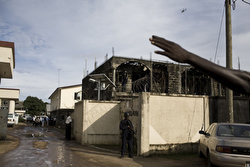
But on November 8, 2011, the day of the second-round vote, the opposition CDC pulled out of the second round of voting, citing “fraud and irregularities” in the October 11th first round. More viscerally, the boycott came a day after an election eve rally at CDC headquarters turned violent, leaving at least one opposition supporter dead and at least eight more seriously wounded in clashes with riot police. The CDC dubbed it “Black Monday.” It was the worst riot to hit Liberia in years, but a government-backed investigative commission called it “a disturbance” in a report. The opposition CDC still appeared on the ballot paper and the election went ahead as planned – albeit with a turnout of less than 40 percent. With the boycott in place, Johnson-Sirleaf – who, like her former ally Taylor, is part Americo-Liberian – won more than 90 percent of the vote and a second term in office.
In Johnson-Sirleaf’s autobiography he President admitted contributing funding to Taylor’s pre-war rebellion. But she also pushed through an extradition request when Taylor was in exile in Nigeria, facilitating his passage to the Special Court in Sierra Leone at its seat in The Hague. “We must recognise that Liberia is greater than any one person, tribe or group of people,” she said at the time, from Monrovia.
Had it not boycotted the runoff, the CDC was still unlikely to beat the incumbent, even in places like Grand Gedeh where she was unpopular. Among the party’s numerous problems, it was running out of cash. Johnson-Sirleaf’s glowing reputation meant she could attract donors with ease. Nigerian president Goodluck Jonathan, a fan of his female counterpart, offered up $6 million, while Angolan president José Eduardo dos Santos gave $5 million. According to sources within Johnson-Sirleaf’s government who spoke to me on condition of anonymity, Johnson-Sirleaf’s Unity Party had about $20 million to splash out on its campaign. It flew helicopters low over Monrovia’s beaches, sprinkling leaflets onto the sand like confetti. Construction workers barely making thirty dollars a month walked over and watched.
Tubman and Weah struggled to raise funds. They had about $200,000 to spend during the run up to the first ballot, but for the second, they couldn’t hire the stadiums, dancers, and singers that Liberians expect at campaign rallies. Since the boycotted election, Johnson-Sirleaf has rarely visited Grand Gedeh or the southeast. In 2009, during her first term, she left with egg on her face after disinviting a youth group to a forum she was hosting on youth issues. She’d known that they wanted to ask about a promised community college in Zwedru that hadn’t been opened, years after funding was allocated.
“Mismanaged funds, again,” said Jim Gwegwie, a teacher in Zwedru, by telephone after the second round. Under his breath, he muttered the name “Bailey.” Chris Bailey was Grand Gedeh’s superintendent, the top government official in the county and a Johnson-Sirleaf appointee. Wildly unpopular among Grand Gedeh’s ethnic Krahn, he had been accused of—and denied—financial malpractice on several occasions.
“In September, the Liberian education board was decentralized, with a ceremony in Zwedru,” Gwegwie said. “Lots of people were invited, but none of the youth were there. Can you imagine? An education ceremony! With no students!”
Others accused Bailey of “redirecting” funds designated for building bridges and roads. Zwedru’s tarred roads and pavements, the pride of Doe, sit in contrast with the rest of the county, which has just one other tarred stretch. A few days after the first round of voting last year, matches and two plastic bags filled with gas were found at Zwedru’s administrative building in what was a suspected assassination attempt on Bailey. Police confirmed attempted arson, although the perpetrators were never caught.
When Bailey became superintendent in 2006, he admitted that Grand Gedeh was in a sorry state. Bailey, the son of a lawyer and a judge, said he would “forge a peace and reconciliation agenda for total unification of citizens,” according to a 2006 newspaper report. But he only succeeded in uniting Grand Gedeans against him. Five years on, Kar, the construction worker, echoed much of the local sentiment when he said he wasn’t “feeling fine” about Bailey’s work. “He’s only doing work for Madam Sirleaf. He’s not doing work for Grand Gedeh,” he said.
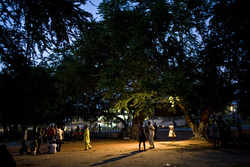
In Monrovia, I met Daniel Kollie, an unemployed steel worker from Zwedru. We sat under a tree in the grounds of the CDC headquarters—a swathe of sand surrounding a football pitch. It was a week after Black Monday, and it had just become clear, from provisional results released that afternoon, that Johnson-Sirleaf had won a second term in office.
“What do I want in life?” Kollie asked himself. “Well, I want some type of job. I don’t want to sit in the bar or be told I’m causin’ trouble. Madam Ellen is not delivering for me. She is only interested in power, not the well-being of the people.”
Now, only God is worthy of trust, or maybe your brother or neighbor, in that order.
As we talked, young men and women surrounded us, listening. Kollie raised his voice, enjoying the attention. Others joined in.
“She’s not our president,” one young man shouted. “She’s only the president of those who want her to be.”
A woman pushed through the crowd. “The election commission is lying to us,” she said. “They said the turnout was 38 percent. It was not.”
“It was only 10 percent.” Another joined in. “Ma Ellen cheated! She is as bad as Qaddafi. We call her Qaddafi’s lover” (A apparent reference to Johnson-Sirleaf’s having had a cordial relationship with Libya’s former leader.)
After the pre-election violence, the government closed three pro-opposition radio stations, and some people feared for their freedom of speech. Over the years, Liberia’s history of coups, counter-coups and disputed victories decimated trust as well as lives. Now, only God is worthy of trust, or maybe your brother or neighbor, in that order.
Talk of imminent massacres began to spread, fueled by anger among opposition voters and dwindling faith in the electoral process. By dusk that day, rumors were the only traffic on the streets. (Liberians are baroque rumormongers. In 2008, Monrovia all but ran out of potato greens, a common staple, after word circulated that all citizens must eat the dish for three days or risk death.) The CDC headquarters had almost emptied out; just a few stubborn supporters remained, drinking coffee on wooden benches, waiting—hoping—that Weah and Tubman would somehow overturn the results. But by 5pm, neither of the leaders had come. Walking away the site, one supporter said she was not disappointed by the no-show. “I know they will come next time,” she said. “They will not let us down.”
Fueling the resentment, a report released by the Carter Center–which concluded that the overall voting process was “conducted transparently and in general accordance with Liberia’s obligations for democratic elections”—found some evidence of second-round voting irregularities in Grand Gedeh. In several instances, the report said, “observers reported seeing consecutive ballots with similar markings.” In another, turnout varied by as much as 400 percent at polling stations within the same precinct, raising “serious questions about the integrity and transparency of the electoral process in Grand Gedeh County.” Johnson-Sirleaf would have won regardless, but the report darkened the already bleak mood in Grand Gedeh.
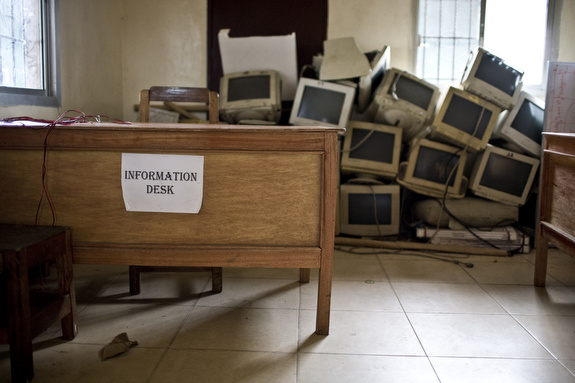
On the sixth floor of the Ministry of Foreign Affairs, one of three buildings in Monrovia with a working elevator, Johnson-Sirleaf invited the media to a discussion ahead of the release of second-round results. “I am determined,” she said, “to make Liberia a post-conflict success story.” She then claimed that the events of the previous weeks would not prevent that goal.
Someone asks a question about reconciliation and youth reintegration. “Oh, I’m very confident that we will be able to reconcile the people,” the president said, in her soft, smooth lilt. “We will respond to the basic needs of the youth.”
How, Madam President? “We will reach out to them, create more jobs, attract more foreign investment. If our young people don’t have the skills to take the jobs, we will emphasize vocational training.”
That same afternoon across town, in the poor area of West Point, Tallboy Tuesday was stacking mobile phone scratch cards in his musty ground-floor apartment. His three-year-old daughter sat in a square of light, cast onto the floor from the small window. Tuesday once fought with one of the units of Charles Taylor—the former rebel leader who became the Liberian president and was convicted in April of aiding and abetting war crimes in Sierra Leone. Now Tuesday is a phone scratchcard salesman. After Liberia’s war ended in 2003, he signed up for the government’s Disarmament, Demobilization, Rehabilitation and Reintegration Program (DDRR). It was supposed to cover Tuesday’s return to formal education, but a funding shortfall meant his school fees never got paid.
Liberians in his situation protested, leading to riots in Monrovia and in the northern town of Ganta. Ex-combatants demanded the payment of a promised $300 resettlement allowance. Until “Black Monday,” the 2004 protests were the last serious riots Liberia had seen. “The government talks about jobs and training,” said Tuesday, who supported the opposition. “But I don’t think they can help us until they understand our problem.”
“They’ve spent too much time on a certain level,” Sherman adds. “They climbed a ladder, reached the top floor and never looked down. Someone took the ladder away, but they never even noticed. Can they even see who is on the bottom rung?”
Between the first and second rounds of voting, Johnson-Sirleaf called for peace during a visit to a community near Cooper’s Beach, half an hour outside central Monrovia. The crowd that gathered to greet her were largely supporters of her Unity Party, but one man stood apart from the rest while the president spoke, his eyes fixed on a trail of ants at his feet.
As she started to leave, he spoke. “Madam,” he said, “We can’t be peaceful ’til we all die.”
During the investigation, Brown came under fire from some Liberian commentators, including newspaper editors and opposition leaders, who said she is too close to the president to lead an independent assessment. In a statement, the Carter Center praised Brown’s credentials but said “the process of nominating commissioners has not been transparent.” Brown said she was not biased and that people should focus on the outcome of the inquiry, rather than those leading it.
In its concluding paragraphs, the commission’s report called on Johnson-Sirleaf to “take the lead” and open dialogue with the CDC on “post-election reconciliation and the way forward on such issues as youth unemployment, skills development and training.”
It did not, beyond a reference to “quick impact training” and “skills development,” explain how.
“Things look great on the surface,” Sherman said. “Liberia is wearing clean clothes, but underneath, it’s got scars all over its body. We’re smelling the wounds that have not healed. Why are we surprised they are there?

“There is a feeling that the development happening here has not really been at the right pace for Liberia,” he said. Tribal ties, too, remain strong, he said. “During the war the country got divided into tribes and sectors; just look at the history of the Krahn, the Gio, the Mandingo. You can camouflage tribal affiliations but they are still very present. All these things that have not been properly addressed are starting to fester.”
Amos Sawyer, a professor and a former interim leader of Liberia, hasn’t been afraid to look into the ravine. Back in 2006, when Liberia’s Truth and Reconciliation Commission—tasked with investigating the civil war and human rights violations—was launched, Sawyer called Liberian reconciliation the “most painful and difficult part of the reconstruction process.”
He has since begun a series of dialogues with the president, and Johnson-Sirleaf knighted him in November. During his acceptance speech, Sawyer urged the president to reach out further and heal old wounds. He said he believed it was now “legacy time; time for our generation of actors to leave our mark and leave the scene.”
Despite preceding it with a Nobel prize win, her second term has already been rockier than her first. She has struggled to unite members of her own party, and she has come under fire from the international community for refusing to consider gay rights legislation. She also has to try to make amends for Black Monday, which might include sitting down with young people with opposing views or visiting Grand Gedeh. Grudge or no grudge, she may have to travel to the edge of the forest, along that long, rough road.
The commission is tasked with addressing festering issues in Monrovia, Grand Gedeh, and elsewhere that led to Black Monday. There is a lot of ground to cover, and the commission still doesn’t quite know how to cover it. As a statement issued by the initiative notes, “the main obstacle to the success of the initiative: a lack of unity.”
The UN and many smaller NGOs are involved in individual reconciliation projects. The Foundation for International Dignity is putting together a youth engagement committee made up of several organizations. It is hosting forums around the country that convene discussions between young people with opposing views.
“People are afraid to let young people air their issues,” Sherman said. “They think war could break out. But Liberians spent years living in fear. Enough of being frightened now.”
Back in Grand Gedeh, soccer—Doe and Weah’s great love—is again proving itself as a great unifier. On a sunny April afternoon, twenty-two young men and women gathered for a game, a short distance from the house that Doe built. It was the final of a tournament launched in November, at the beginning of Liberia’s official dry season and shortly after Black Monday. Ahead of the final match, held a short while before Johnson-Sirleaf finally heeded demands and fired Chris Bailey, players strung the flag of Grand Gedeh–blue for unity, green for the forest, orange for the sun, white for peace–along the back wall of the soccer pitch.
The competition almost didn’t happen; the idea emerged after a youth worker came to Anthony Worlu, Grand Gedeh’s representative from the Ministry of Youth and Sport, with a problem he hadn’t been able to solve. A team of pro-CDC football players wanted to take on a Unity Party side.
“We can’t let this happen,” the youth worker said, worried that violence might break out.
“You’re right,” Worlu said. “They will probably fight.”
The two looked at one another. After a moment, Worlu spoke. “Exactly what they need. Let them play.”
